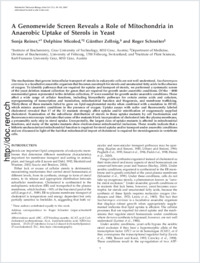A genomewide screen reveals a role of mitochondria in anaerobic uptake of sterols in yeast
- Reiner, Sonja Institute of Biochemistry, Graz University of Technology, Austria
- Micolod, Delphine Department of Medicine, Division of Biochemistry, University of Fribourg, Switzerland
- Zellnig, Günther Institute of Plant Sciences, Karl-Franzens University Graz, Austria
- Schneiter, Roger Department of Medicine, Division of Biochemistry, University of Fribourg, Switzerland
-
2005
Published in:
- Molecular Biology of the Cell. - 2006, vol. 17, no. 1, p. 90-103
English
The mechanisms that govern intracellular transport of sterols in eukaryotic cells are not well understood. Saccharomyces cerevisiae is a facultative anaerobic organism that becomes auxotroph for sterols and unsaturated fatty acids in the absence of oxygen. To identify pathways that are required for uptake and transport of sterols, we performed a systematic screen of the yeast deletion mutant collection for genes that are required for growth under anaerobic conditions. Of the ~4800 nonessential genes represented in the deletion collection, 37 were essential for growth under anaerobic conditions. These affect a wide range of cellular functions, including biosynthetic pathways for certain amino acids and cofactors, reprogramming of transcription and translation, mitochondrial function and biogenesis, and membrane trafficking. Thirty-three of these mutants failed to grow on lipid-supplemented media when combined with a mutation in HEM1, which mimics anaerobic conditions in the presence of oxygen. Uptake assays with radio- and fluorescently labeled cholesterol revealed that 17 of the 33 mutants strongly affect uptake and/or esterification of exogenously supplied cholesterol. Examination of the subcellular distribution of sterols in these uptake mutants by cell fractionation and fluorescence microscopy indicates that some of the mutants block incorporation of cholesterol into the plasma membrane, a presumably early step in sterol uptake. Unexpectedly, the largest class of uptake mutants is affected in mitochondrial functions, and many of the uptake mutants show electron-dense mitochondrial inclusions. These results indicate that a hitherto uncharacterized mitochondrial function is required for sterol uptake and/or transport under anaerobic conditions and are discussed in light of the fact that mitochondrial import of cholesterol is required for steroidogenesis in vertebrate cells.
- Faculty
- Faculté des sciences et de médecine
- Department
- Département de Biologie
- Language
-
- English
- Classification
- Biological sciences
- License
-
License undefined
- Identifiers
-
- RERO DOC 5776
- DOI 10.1091/mbc.E05-06-0515
- Persistent URL
- https://folia.unifr.ch/unifr/documents/299936
Statistics
Document views: 158
File downloads:
- Texte intégral: 182
